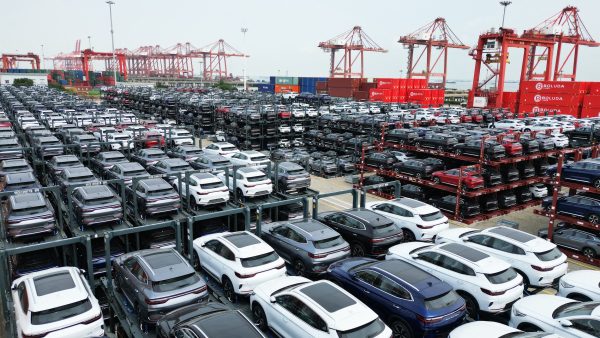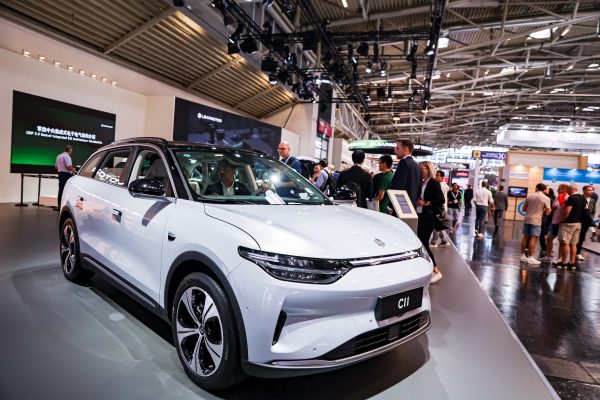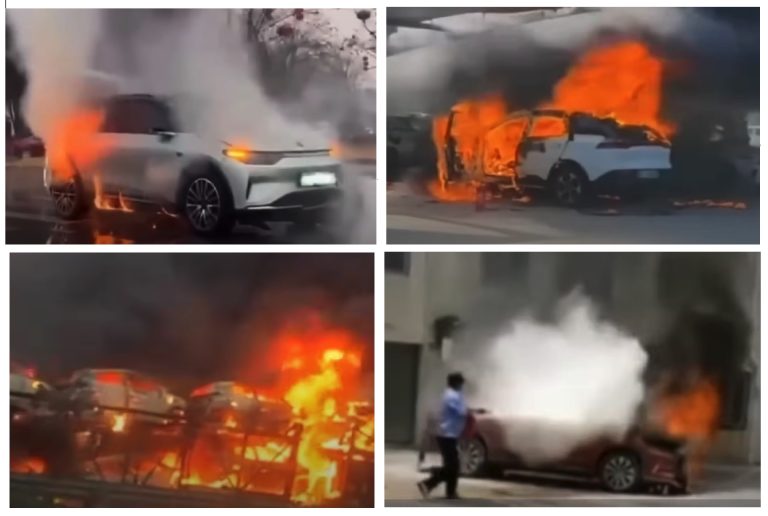At the “Lianghui” government conferences of the People’s Republic of China (PRC) held this March 4–11, the communist regime emphasized “rejuvenating” the Chinese economy through technological innovation — specifically, investment in “new quality productive forces.”
Central to this technological approach has been Beijing’s generous subsidies to electric vehicles, known domestically as “new energy vehicles” (NEVs). In 2023, China surpassed Japan to become the world’s largest automobile exporter, exporting nearly 5 million vehicles. Of those, 1.2 million were NEVs.
But despite state largess and force of numbers, there are growing concerns about the quality and safety of Chinese-made EVs — particularly complaints from Chinese drivers regarding the country’s top brands such as BYD. The rise in reports of battery fires and other hazards raises questions about the reliability of the vehicles and their key components, which are also made in China.
- China’s Overseas Product Dumping: Addressing Unfair Competition Caused by Systemic Differences
- Japan Moves to Untether Popular Line App From Korean Shareholder After Data Breaches
According to statistical data from China’s National Fire and Rescue Administration, the rate of spontaneous fires in NEVs increased by 32 percent in the first quarter of 2024. This means that currently, an average of eight NEVs catch fire in China every day — nearly 3,000 a year.
By contrast, as of this May 28, just 232 Tesla cars have been reported to have caught fire since 2013, according to Tesla-Fire.com. Fatalities involved with these incidents number 83 so far.
Fiery incidents and consumer fears of Chinese-made EVs
Success
You are now signed up for our newsletter
Success
Check your email to complete sign up
In late 2023, news that four BYD dealerships were stricken by fire in a single month made waves on social media. Chinese dealerships are known as 4S stores, a term encompassing sales, service, spare parts, and survey (information).
Many internet users expressed particular surprise at the fact that the fires involved brand-new BYD vehicles that had never before been driven. One recent video spread online shows a car carrier trailer laden with Chinese-made EVs engulfed in flames, sparking heated discussion.

One owner of a BYD car described how, when charging their vehicle, the car suddenly began emitting smoke and soon thereafter spontaneously burst into flames. According to the owner, who related their experience online, the car had been purchased from an authorized dealer and was maintained by a 4S shop. Other internet users posted similar stories, often with footage of the fires.
The seeming propensity of Chinese NEVs to catch fire has given rise to an online neologism that Sounds similar to both the auto brand name “BYD” and the Mandarin word for “to explode.”
Possible causes for the higher frequency of fires in Chinese-made EVs include less robust batteries and advanced battery monitoring technology that shuts down the vehicle’s functions in the event of an accident.
Batteries contain large amounts of liquids, and are liable to produce flammable gas if damaged in a collision or from improper construction. Hence, durable and well-built batteries are essential for a safe EV.
- ‘China has been poisoned for over a century’: Statements From the Tuidang Movement (April 2024)
- High Inflation, Living Costs Continue to Impact Americans Despite Better Economic Figures
EV companies such as Tesla have, in addition to maintaining high standards of battery construction, also included monitoring software in their vehicles to lock down the machine in a collision. Chinese-made EVs may not have this technology available or equipped.
Top brands impacted
On Jan. 19, 2024, a video of an NEV spontaneously catching fire on the road spread on Chinese social media. The burning vehicle was identified as a Leapmotor C11, with the fire initially starting near the rear wheels and chassis before quickly engulfing the entire car.
The Leapmotor C11 is considered a top-tier luxury electric SUV with excellent overall performance, and its sales are increasing. This May, Leapmotor delivered 12,058 units.

The day before that incident, an electric car of the popular brand Xiaoping had also caught fire while parked next to a charging station. By the time the fire was put out, only the chassis remained.
On April 26, a tragic accident occurred on a highway in Yuncheng, Shanxi Province, where an electric-powered M7 SUV crashed and caught fire, resulting in the deaths of three passengers. Many viewing footage from the scene suspected that the collision avoidance system malfunctioned. Meanwhile, it appears the victims also had trouble exiting the stricken car, as the video shows people and workers nearby desperately trying to break the doors and windows.
In another incident, a woman trying to get out of her EV could not open the door, even pulling until her hands were red.
In May 2023, BYD spent 3.6 billion yuan (US$530 million) to acquire online insurance firm Tianyancha, which the automaker repurposed to engage in vehicle insurance. This led to internet speculation that NYD was compelled to take this step as a result of unaffiliated insurance companies declining to cover BYD vehicles.
Pandaily, a Beijiong-based website, reported in February 2023 that it is common for Chinese automakers to set up their own insurance companies. The outlet noted that “XPeng, Tesla China, and NIO established their own insurance divisions in 2018, 2020, and 2022 respectively,” while “GAC Group, FAW Group, and Geely have all taken stakes in insurance certificate holders.”
There is also a growing political dimension to the perception — and criticism — of Chinese-made EVs. One blogger posting a video commenting on the autonomous driving features of Chinese electric cars soon found his post reported.
A personal message from the person who made the report warned, “Your video about domestic electric vehicles has already been reported as evidence. The Ministry of State Security will submit records about you and investigate the sources of whatever anti-China foreign forces are backing you financially.”







